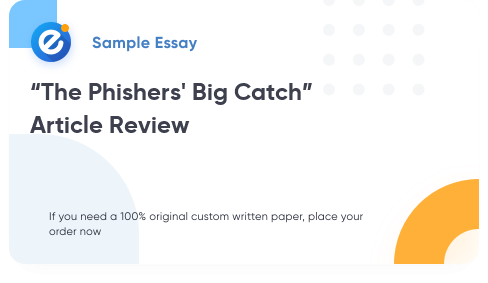
Among the variety of articles purposely related to spheres of e-business and intellectual property, which I discovered in the Web, I consider one especially interesting and indicative of legal subjects, which may arise in those spheres. It is the article “The phishers’ big catch” from The Economist. The article in The Economist reports about the huge theft of company’s data, especially e-mails. The author of this article pays special attention to the outcomes of a problem.
Among legal subjects raised in this article, it is possible to identify the following: since almost entire e-business sphere relies upon the e-mails of the clients, business partners and investors, people now cannot be sure their intellectual property is perfectly protected or that no contradictory violations on the property would appear after the recovery of the database. Simultaneously, the article draws readers’ attention to the fact that the security breach, while being a disgusting humiliation for Epsilon, also serves as an instance of what kinds of nuisance e-commerce may experience from time to time. In fact, if such an incident has occurred once, it may occur again and again in other organizations; and, as the author of this piece of writing points out, it is simple to imagine what trouble could arise in a similar situation. Thus, one of the major legal issues e-commerce faces is the evolvement of supplementary protection tools and mechanisms, which, together with the increased defense of crucial private data, would guarantee the safety of intellectual property even during such complex troubles as the one that impacted Epsilon.
Calculate the cost of essay
This case involves an important legal issue. Almost everybody who has the e-mail account uses it for personal and business grounds. It is quite natural for people to expect a little privacy in the e-mail, and there are all types of federal and state regulations, which defend that privacy. Even if thieves do not still money with the help of the e-mail, stealing e-mail is a fraud and crime anyway. However, most commonly, the obtained data are utilized by the thief to make money or some goods. In the most states, there are criminal and civil identity theft laws. Furthermore, in some states, it is an assault of privacy to look at somebody’s private data, and it is a crime. In many states, accessing and retelling another individual’s private data are an invasion of privacy, which may make a hacker legally responsible for money damages to his casualty. There is a code, which clearly defends people against hacking electronic information. The 18 U.S.C. § 2701 protects against any unauthorized access to digitally stored data. There is a range of punishments for hacking e-mail. They may comprise the jail time up to three years and fines up to $1 million.
Limited Time
special offer
It is possible to make a conclusion that legal matters influence e-business directly and indirectly. For instance, the postponement of related e-business activities during the time required for the investigating the cause of the leak has some economic costs. Conversely, even though the problem was solved, this accident definitely damaged the public image of Epsilon. Internet thieves are becoming more experienced and savvy, and I am confident that these problems may repeat in the future. Thus, the only realistic resolution for the e-businesses is to strengthen their computer system and to amplify security of the intellectual property in the recent future.

